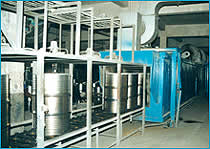In the production process of steel drums, surface degreasing, phosphating, and rinsing of old drums prior to surface coating will generate large quantities of industrial wastewater. These waste waters are typical acidic and alkaline waste waters in industrial waste water. If these waste waters are directly discharged, they will corrode pipes, damage agricultural crops, damage fish and other aquatic organisms, endanger human health, and damage the normal operation of biological treatment systems. Therefore, they must be Deal with it properly. Generally, the treatment methods for acid and alkali industrial wastewater are: high-concentration acid and alkali wastewater (with acid and alkali content above 3%~5%), should be first considered for recycling and comprehensive utilization; low-concentration acid and alkali wastewater When recycling or comprehensive utilization is of little significance, neutralization treatment should be carried out before discharge so that the pH value can be restored to a certain range near neutral (pH is 5 to 9). The steel drum production wastewater belongs to low-concentration wastewater and is generally treated by neutralization method.
First, treatment process and method
The use of chemical agents to neutralize the pH of the wastewater is called neutralization. The commonly used neutralization methods are as follows.
1, acid, alkali wastewater comprehensive method
This is a simple and economical waste disposal method. This method is the common introduction of acid and alkali wastewater into the neutralization tank, mixing and stirring. The volume of the neutralization pond should be considered in terms of the amount of wastewater from 1.5 to 2.0 hours.
This method is suitable for both alkaline and acidic water in the waste water produced during production. For example, there are two steps of pickling and alkali cleaning in the treatment of the new steel barrel coating. The waste water produced in the process can be used for profit, and the waste treatment effect is also good.
2. Pharmaceutical neutralization method
The neutralizing agents for acidic wastewater include lime, caustic soda, sodium carbonate, limestone, calcium carbide slag, boiler ash, and softening station waste slag, etc. The neutralizing agents for alkaline wastewater include sulfuric acid, hydrochloric acid, and acidic exhaust gas. The dosage of neutralizing agent was determined according to the experimentally determined waste water pH.
Lime is the most commonly used neutralizer for acidic water. It not only neutralizes any acidic wastewater, but also produces calcium hydroxide that has agglomeration. There are two types of lime dosing methods: wet casting and wet casting. The dry investment method is to uniformly add the crushed quick lime to the water. The wet investment method is to dissolve the quick lime in the digestion tank to a concentration of 40% to 50% and then to acidify the 5% to 10% Ca(OH)2 emulsion. mixing. Mixing and reaction are done in one pool.
3, filtering and neutralization
Limestone and marble (CaCO2) are used as the filter media, and acidic wastewater is passed through the filter layer. The method of neutralizing water is called filtering neutralization tank and drum neutralization pool.
The choice of filter media and the solubility of the neutralized product are closely related. Neutralization reaction of the filter occurs on the surface of the particles. If the solubility of the neutralized product is small, an insoluble hard shell is formed on the surface of the filter particles to prevent the neutralization reaction from proceeding and the neutralization reaction fails. Therefore, according to the composition and processing capacity of the acidic wastewater, the filter material and filter structure can be properly selected to achieve the best treatment effect.
Second, wastewater treatment facilities
The neutralization method is used to treat steel drum production wastewater. The facilities built are the simplest, requiring neither complicated equipment nor large investment.
1. Measurement of acidity and alkalinity of waste water
The simplest measurement method is to use a pH test paper to dip in water to observe the color change degree of the test paper, and to judge the pH of the waste water. Generally, it does not require too accurate measurement, as long as the wastewater is treated with a pH test paper, and the pH can be discharged when the pH reaches 5-9.
2, treatment agent
According to the different types of wastewater acid and alkali and different treatment methods, different treatment agents are selected. The principle of selection is as cheap as possible to reduce the treatment cost.
3, wastewater treatment pool
For the acid and alkali waste water neutralization method and the chemical neutralization method, under normal circumstances, as long as a brick cement tank is built outside the workshop, the waste water is introduced into the tank for treatment and discharged after the treatment reaches the requirements. The pool can be built below the ground level, or it can be built on the ground level, and it is also convenient to maintain because after a long time, the sediment in the pool increases and needs to be cleaned.
For the filtration and neutralization method, a pool must be built as well, except that the filter material is placed in a net frame, the net frame is placed in the pool, and the water inlet and the outlet are blocked, so that the waste water can be directly discharged after filtering through the filter material.
The size of the pond depends on the amount of waste water. Under normal circumstances, it should be able to hold the waste water produced in 2 hours.
